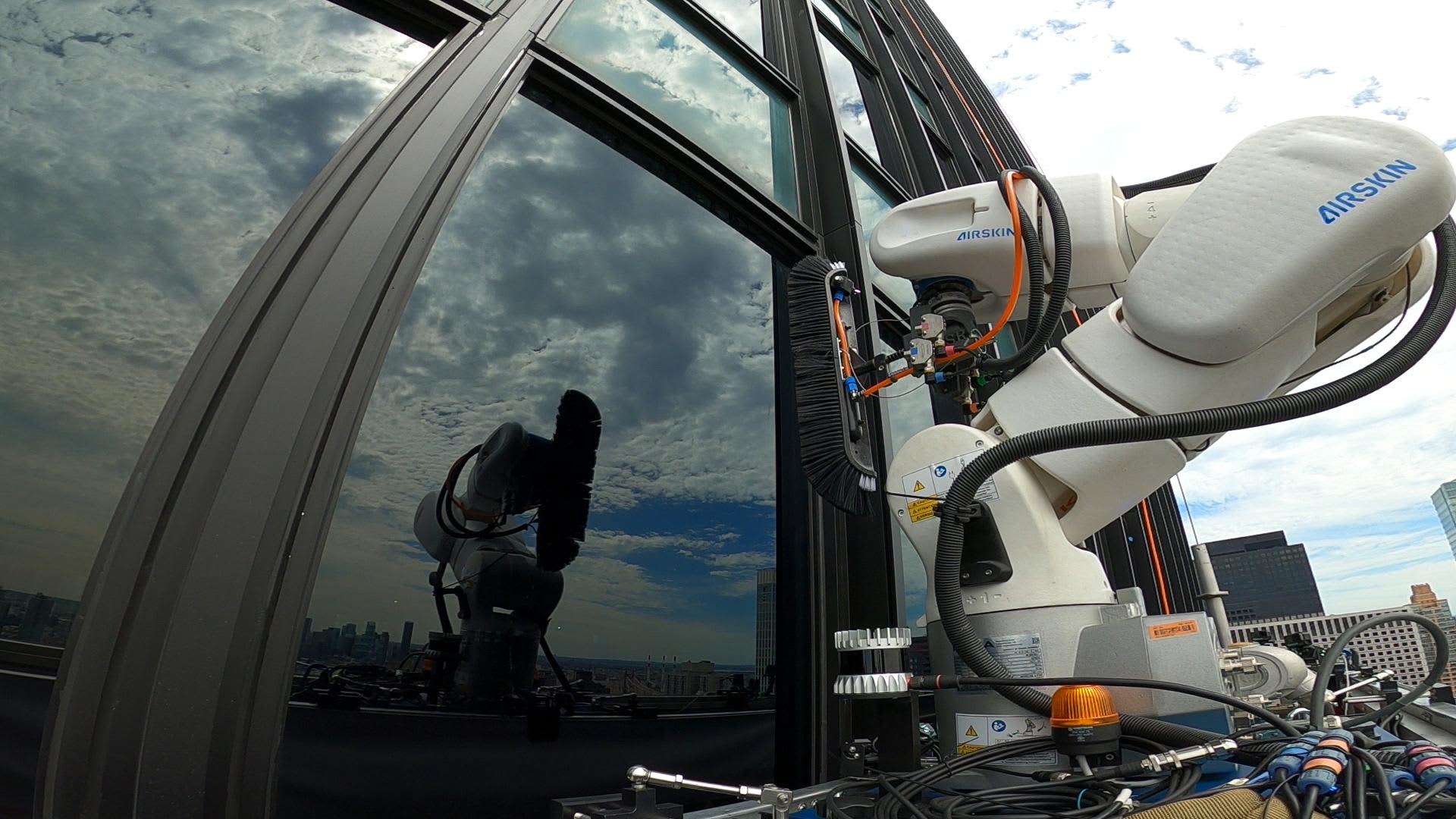Skyline Robotics is disrupting the century-old practice of window washing with new technology that the startup hopes will redefine a risky industry.
Its window-washing robot, Ozmo, is now operational in Tel Aviv and New York, and has worked on major Manhattan buildings like 10 Hudson Yards, 383 Madison, 825 3rd Avenue, and 7 World Trade Center in partnership with the city’s largest commercial window cleaner Platinum and real estate giant The Durst Organization.
The machine is suspended from the side of a high-rise. A robotic arm with a brush attached to the end cleans the window following instructions from a LiDAR camera, which uses laser technology to map 3D environments. The camera maps the building’s exterior and identifies the parameters of the windows.
“What the LiDAR is actually doing as the basket is descending is sort of painting itself a picture of the facade that it’s facing,” Blum said.
Although the Ozmo is controlled by a human operator at the top of the building, chief operating officer and founder Ross Blum said that the robot could be operated fully remotely.
“That person, other than regulation, doesn’t actually have to be there for our sake,” Blum said. “We could, in theory, remote-control Ozmo from different parts of the world.”
Reverse osmosis removes contaminants from the water, hence the name Ozmo. According to Blum, this makes the cleaning process more efficient.
“We don’t need a separate squeegee and a separate brush to get a perfectly clean window,” he said. “It’s one motion,” he said.
The current cost of the Ozmo is approximately $500,000, which has a three-to-five-year payback for building owners, according to Skyline Robotics board member and Platinum CEO James Halpin.
A changing workforce
The machine is part of a new wave of technology that can replicate human work. In recent months, artificial-intelligence innovations like ChatGPT have dominated headlines, prompting questions about employment vulnerabilities in customer service, writing and computer programming gigs.
A 2020 report by the World Economic Forum states that 85 million jobs will be displaced by 2025 due to the “robot revolution,” but that 97 million jobs requiring “reskilling and retraining” will be generated.
Jobs in maintenance and construction, like window washing, were ranked as having a “medium” share of tasks (30% to 70%) susceptible to automation, according to a 2016 study by the Brookings Institution.
Platinum’s Halpin said his company was interested in supporting the Ozmo because of a worker shortage in the field of high-rise window washing.
“Currently, we are experiencing a labor shortage in all real blue-collar fields in New York City,” Halpin said. “We could hire another 20% just to keep up with the current work that we have at this point.”
Both Halpin and Blum said their goal eventually is not to replace human workers but to “retrain and reassign” window washers to operate the technology.
But logistically, the Ozmo cuts down on the amount of people needed to clean a building from a team of three to four human window washers to one operator.
The Ozmo has some window washers, like Jose Nieves, a 23-year veteran of the industry and window washer at Rockefeller center, concerned about their livelihoods. He believes the dangers of window washing are overblown and that human labor should be preserved.
“Of course, there are dangers with our profession, but we are skilled, trained workers who take those risks very seriously much like many dangerous jobs that exist in this country,” Nieves said. “Are there no possible dangers associated with a robot operating heavy equipment hundreds of feet above people’s heads?”
Nieves is represented by the SEIU 32BJ, the property service union for many of the workers on the East Coast. According to the organization, there are 500 to 550 unionized window washers in New York City who earn $31.69/hour during the peak summer season.
“As a society we should not be cutting costs on the backs of workers,” Nieves said. “I would say we have been doing a great job without these robots. Don’t fix it unless it’s broken.”
Robot-human collaboration
A growing legion of futurists, like senior research associate at Harvard’s Labor and Worklife Program Aleksandra Przegalińska, study how humans and robots can collaborate, and specifically how machines can take on tedious or dangerous tasks for humans.
Because the Ozmo technology is so new, she said it’s hard to fully evaluate, but the opportunity to shift human labor away from a dangerous field is appealing.
She cites one example when machines, like the Moxi, were deployed to deliver medication to infected patients during the height of the coronavirus pandemic.
“Certainly, in those areas where your health, your existence is at risk as a human, using a machine, a robot is something worth considering,” Przegalińska said.
Skyline has been working on the robot since 2017 and the company raised $6.5 million in their pre-Series A funding, in addition to a grant from the Israeli government.
This story originally appeared on CNBC

